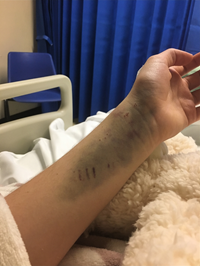 “When I woke up on December 27th, that's when I knew something was very wrong. I had a splitting headache and I could hardly move. Mum took me to the doctors but I was unable to walk without help, I couldn’t physically hold a pen to fill in the temporary registration form, couldn’t sit up straight on a chair and I couldn't really speak to the doctor. The doctor did some tests and she was extremely concerned so I was admitted to hospital.
“When I woke up on December 27th, that's when I knew something was very wrong. I had a splitting headache and I could hardly move. Mum took me to the doctors but I was unable to walk without help, I couldn’t physically hold a pen to fill in the temporary registration form, couldn’t sit up straight on a chair and I couldn't really speak to the doctor. The doctor did some tests and she was extremely concerned so I was admitted to hospital.
“My dad took me straight there and I remember being put into a wheelchair and wheeled off for a CT scan. It all happened very quickly. Then I remember lying in a bed somewhere screaming because the lights were too bright and the beeping of machines were hurting my ears. Then I just black out.
“I was sedated for the next 3-4 days and all I remember from that time is screaming 'NO, not a lumbar puncture'. I’m told I was in a state, kicking out, pulling my cannulas out of my hands. I kicked my dad in the face at one point and another time it took six nurses to restrain me. I must have been very distressed.
“I don't remember being given treatment with antibiotics but I’m told I was lucky this treatment was started quickly, before my diagnosis was even confirmed as meningitis, and before the rash developed.
“My family and closest friends were so worried and didn't know if I was going to wake up. Even now, I don't really remember when I did wake up and don’t remember most of the conversations I’m told I had with people in the days afterwards. I couldn’t concentrate on anything and was obsessed with watching the film Elf.
“Seven days after being admitted I was well enough to go home. The doctors said I had made a miraculous recovery.
“Although there haven't been many visible side effects, I was later diagnosed with chronic headaches and migraines. I am currently on medication for this. My coordination still isn’t good and my left side of my body is much weaker than my right making it difficult to play sport. For a while I developed a stutter and was just unable to speak properly.
“I did go back to uni later in the year but because of how much I had missed and how I was my I was struggling to concentrate I decided to defer and restarted my first year again this September.